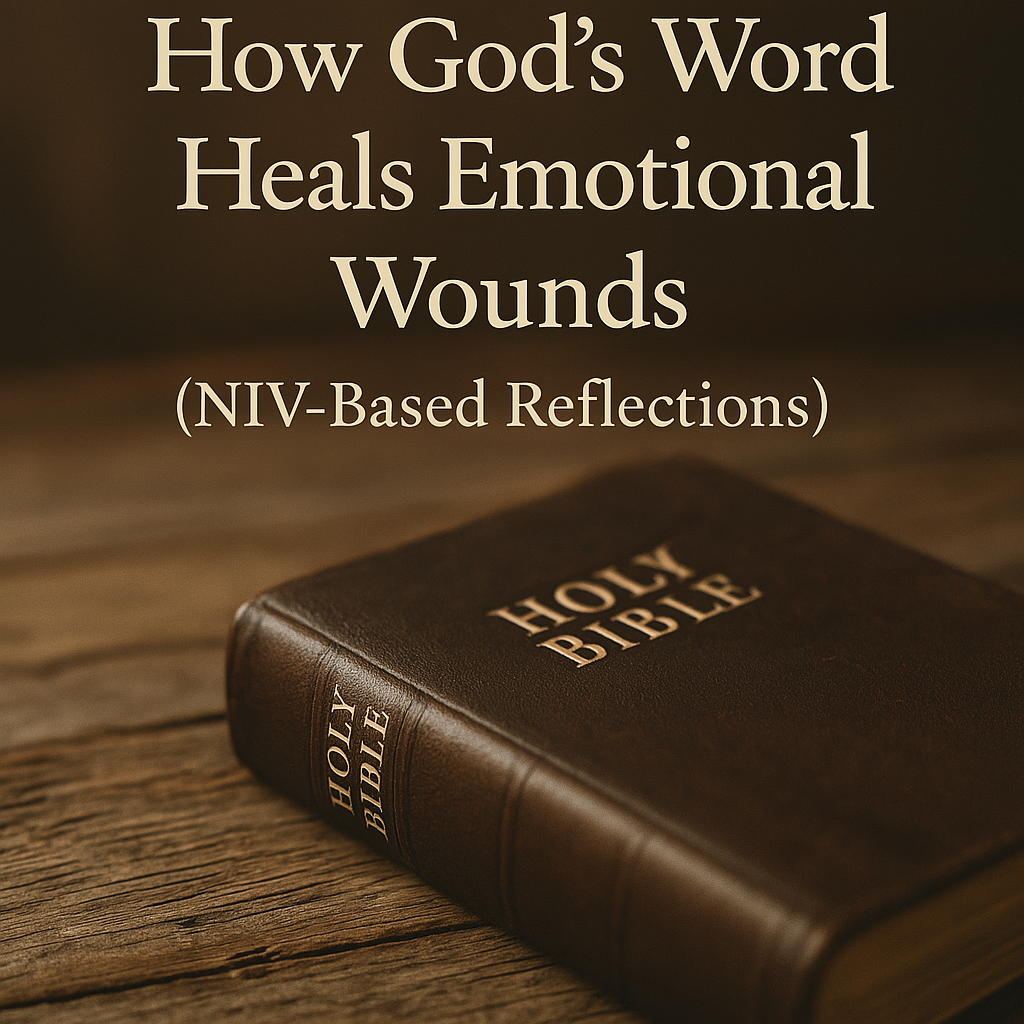The Power of Scripture in Times of Emotional Pain
Emotional wounds often go unseen by others, but their impact can be deep and long-lasting. Whether it’s rejection, loss, betrayal, or failure, emotional pain can leave us feeling broken and distant from hope. As believers, however, we are not left alone in our suffering. The Bible offers real comfort and practical steps for healing. Through God’s Word, we discover His nearness, compassion, and the path toward restoration.
Psalm 147:3 (NIV) says, “He heals the brokenhearted and binds up their wounds.” This verse sets the tone for the kind of healing only God can offer. When emotional pain runs deep, the first and most powerful source of recovery is God’s truth.
Recognizing the Root of Emotional Wounds
Healing starts with identifying what hurts. The Bible helps us name and face our pain honestly, without shame. David’s Psalms are a profound example of this. In Psalm 6:6 (NIV), he says, “I am worn out from my groaning. All night long I flood my bed with weeping and drench my couch with tears.” David doesn’t hide his emotions—he brings them to God.
We must follow the same pattern. God is not surprised by our pain. In fact, He invites us to bring our brokenness to Him. Denying our hurt only delays healing. Confessing our pain and seeking God’s help is the first step to restoration.
God’s Word Offers Comfort and Understanding
The Scriptures are filled with encouragement for the brokenhearted. Isaiah 61:1 (NIV) says, “He has sent me to bind up the brokenhearted, to proclaim freedom for the captives and release from darkness for the prisoners.” Jesus Himself fulfills this prophecy, offering healing not just for the body but for the heart.
When we immerse ourselves in God’s Word, we don’t just gain knowledge—we receive comfort. The Holy Spirit uses Scripture to remind us that God understands our pain and has the power to heal it. Romans 15:4 (NIV) says, “For everything that was written in the past was written to teach us, so that through the endurance taught in the Scriptures and the encouragement they provide we might have hope.”
Replacing Lies with Biblical Truth
Emotional wounds are often tied to lies we believe—“I’m not worthy,” “I’ll always be alone,” “God doesn’t care.” But these are not truths. God’s Word exposes these lies and replaces them with His promises.
For example:
- Lie: “I’m not loved.”
Truth: “I have loved you with an everlasting love” (Jeremiah 31:3, NIV). - Lie: “I’ll never be enough.”
Truth: “You are God’s handiwork, created in Christ Jesus to do good works” (Ephesians 2:10, NIV). - Lie: “No one understands me.”
Truth: “We do not have a high priest who is unable to empathize with our weaknesses” (Hebrews 4:15, NIV).
Daily meditation on these truths rewires our thinking and rebuilds our emotional foundation.
Praying Through Pain: Letting Scripture Guide You
Prayer is essential to emotional healing, but sometimes we don’t know what to say. Thankfully, the Bible gives us language for our prayers. We can borrow words from the Psalms or speak promises from God’s Word back to Him.
When feeling overwhelmed, pray Psalm 61:2 (NIV):
“From the ends of the earth I call to you, I call as my heart grows faint; lead me to the rock that is higher than I.”
When you feel unseen or forgotten, speak Isaiah 49:15-16 (NIV):
“I will not forget you! See, I have engraved you on the palms of my hands.”
These Scriptures are not magic formulas, but they help us connect emotionally and spiritually to the God who hears and heals.
Forgiveness and Freedom
Sometimes emotional wounds come from what others did to us. Other times, we wound ourselves with guilt and regret. In both cases, forgiveness plays a major role in healing. Ephesians 4:31-32 (NIV) says, “Get rid of all bitterness… Be kind and compassionate to one another, forgiving each other, just as in Christ God forgave you.”
We forgive not because it’s easy, but because we are forgiven. Holding on to resentment or guilt blocks the flow of healing. God wants us to be free—not only from pain, but from the chains of unforgiveness.
A New Identity in Christ
One of the greatest gifts of Scripture is the reminder of who we are in Christ. Emotional wounds often distort our self-image. We begin to see ourselves as victims, as broken beyond repair. But 2 Corinthians 5:17 (NIV) says, “If anyone is in Christ, the new creation has come: The old has gone, the new is here!”
You are not defined by your wounds. You are defined by what Christ has done for you. You are loved, chosen, redeemed, and restored.
Living with Renewed Hope
Healing doesn’t always happen overnight, but it happens one promise at a time. When we stay rooted in God’s Word, healing flows—slowly, deeply, and permanently. Psalm 30:5 (NIV) reminds us, “Weeping may stay for the night, but rejoicing comes in the morning.”
Trust that God is working, even when you can’t feel it. Keep returning to His Word. Keep praying. Keep walking. Your healing is coming, and God will use your pain to shape a testimony of His grace.
Moving Forward with God
God’s Word is more than just encouragement—it’s healing, direction, and truth. When we invite Scripture into our wounds, we open the door to transformation. Start today by choosing one verse that speaks to your pain and let it sink deep into your heart. God is faithful to complete what He begins, and your healing journey is safe in His hands.

